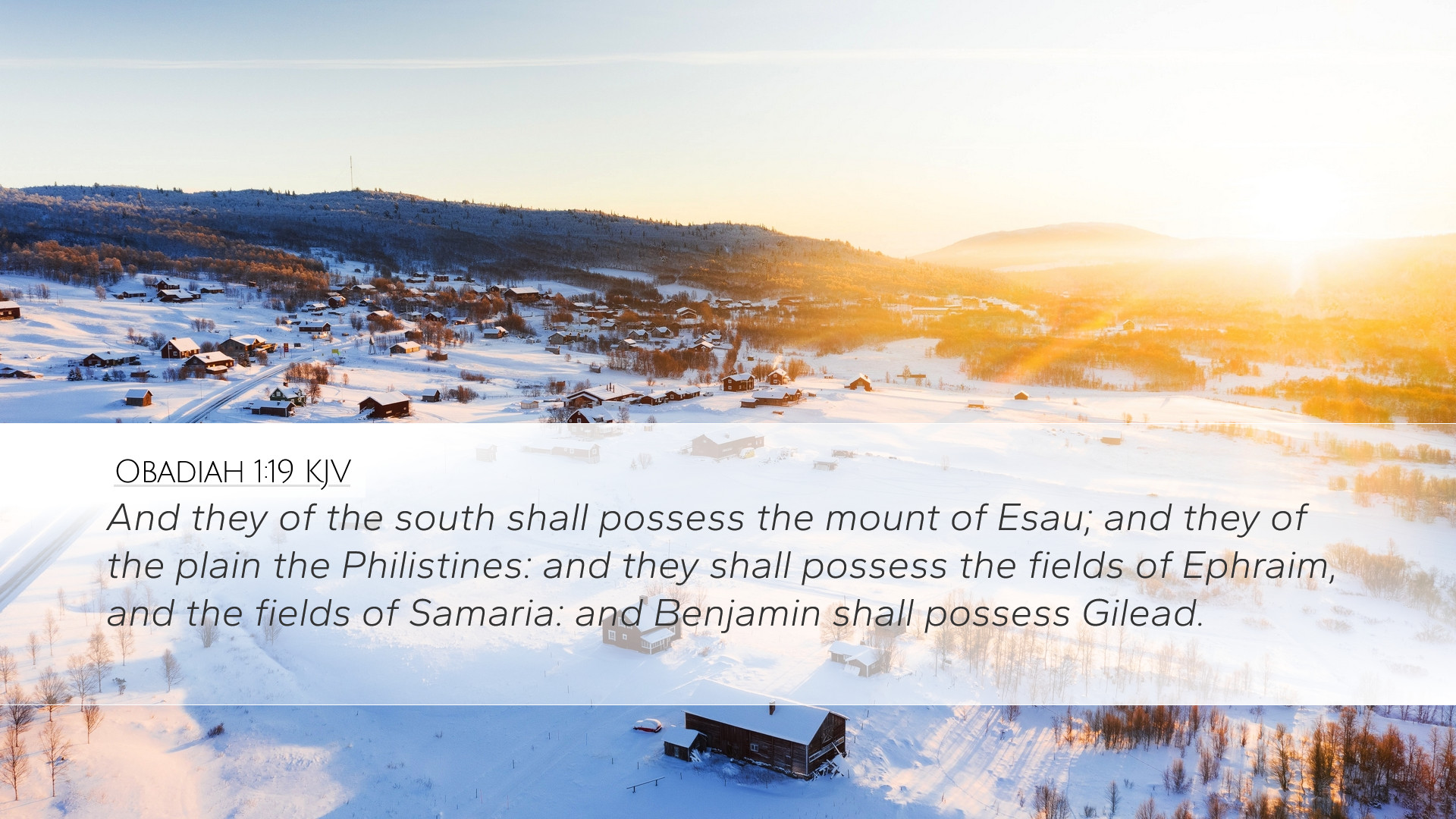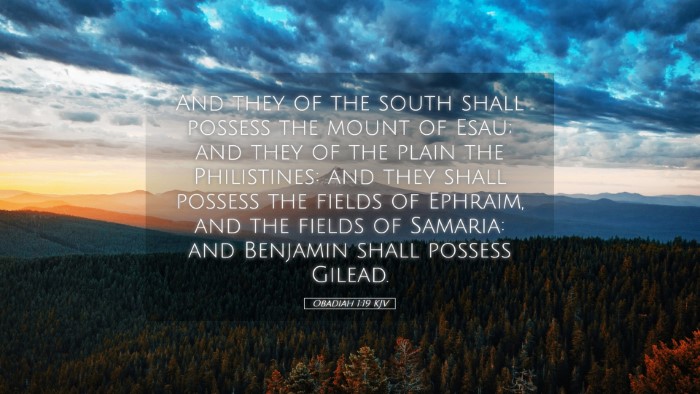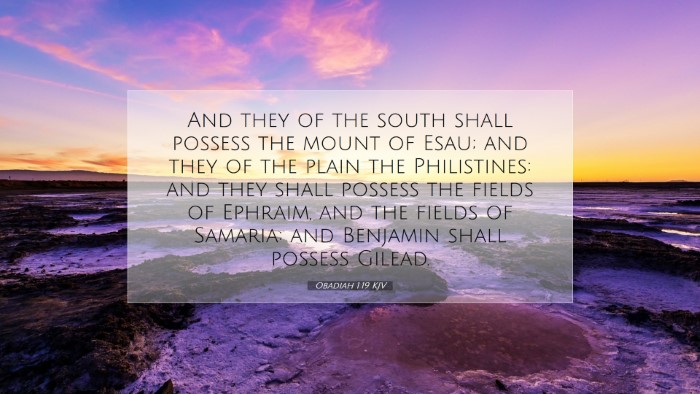Commentary on Obadiah 1:19
Introduction
The Book of Obadiah, the shortest book in the Old Testament, presents a profound prophetic message centered on the themes of judgment and restoration. Obadiah 1:19 speaks specifically to the future of the people of Israel and the promises of their ingathering after judgment. In this commentary, we will explore the insights from public domain commentaries by Matthew Henry, Albert Barnes, and Adam Clarke to provide a comprehensive understanding of this verse.
Text of Obadiah 1:19
"And they of the South shall possess the mount of Esau; and they of the plain the Philistines: and they shall possess the fields of Ephraim, and the fields of Samaria: and Benjamin shall possess Gilead."
Context of the Verse
Obadiah's prophecy primarily addresses the judgment of Edom and serves as a reminder of God's sovereignty. The Edomites, descendants of Esau, are criticized for their violence against the Israelites during their plight. The verse reflects God’s promise of restoration to His people after their exile and affliction.
Insights from Matthew Henry
Matthew Henry provides a detailed exposition of the promised restoration mentioned in this verse. He emphasizes that the Israelites will regain territories that were lost, highlighting the specific regions:
- The Mount of Esau: Referring to the area formerly under Edomite control, which would return to Israel.
- The Plains of the Philistines: Suggesting a reconquest that expands beyond previous borders.
- Fields of Ephraim and Samaria: Symbolizing the restoration of two major tribes known for their strength and prominence.
- Gilead: Indicating a significant area east of the Jordan, important to the degenerate history of Israel.
Henry further reflects on the unmistakable theme of divine justice and the eventual triumph of God’s people over their enemies. He draws notable parallels to the New Testament when discussing how believers possess spiritual territories through faith, linking the prophecy to the realities of the Kingdom of God.
Insights from Albert Barnes
Albert Barnes in his commentary expands on the theological implications of this prophetic promise. He notes:
- Restoration of Land: The promise signifies not just physical restoration but also a return to spiritual fidelity. Barnes emphasizes that this reclamation serves as a divine reward for faithfulness.
- Judgment upon Edom: Barnes posits that the fall of Edom serves as a necessary precursor to Israel's restoration, demonstrating God's justice in correcting sin.
- Inheritance Promised: The mention of specific regions reaffirms the covenantal promises made to the patriarchs regarding their descendants, affirming the continuity of God’s plan through history.
Moreover, Barnes suggests that this restoration reflects a broader eschatological hope, where the people of God will ultimately inherit not only the land but the fullness of God’s promises in the end times.
Insights from Adam Clarke
Adam Clarke's commentary on this verse elaborates on the geographical and cultural implications of the territories mentioned. He points out:
- Geographical Significance: The areas specified in the verse were historically contested and essential for the survival and expansion of Israel.
- Symbol of Unity: Clarke emphasizes that the reunion of the tribes suggested the restoration of unity among God's people, once divided due to sin and rebellion.
- Prophetic Hope: He insists the prophecy provides a source of hope for exiled Israelites and future generations, reinforcing faith amidst adversity.
Clarke also calls attention to the broader implications of territorial claims for modern readers, highlighting the ongoing significance of land, identity, and divine promise within the Judeo-Christian tradition.
Theological Reflections
This verse, rich in theological significance, invites scholars and theologians to reflect on the nature of God’s promises, the centrality of repentance in restoration, and the overarching narrative of redemption in Scripture.
- Divine Sovereignty: The restoration reinforces God’s rule over history and His faithfulness in fulfilling promises.
- The Judgement-Restoration Cycle: The verse illustrates a cyclical pattern found throughout the Scriptures where God's judgment leads to His people's eventual restoration.
- Hope for Restoration: The prophetic message resonates with present-day believers, reminding them of spiritual inheritance and the hope of redemption through Christ.
Conclusion
Obadiah 1:19 encapsulates a critical component of God's plan for His people, marking a transition from judgment to restoration. By synthesizing insights from Matthew Henry, Albert Barnes, and Adam Clarke, we gain a deeper understanding of the prophecy’s implications for both ancient Israel and contemporary believers. This restoration serves as an encouragement to remain steadfast in faith, trusting in God’s sovereign plans for His people, and looking forward to the ultimate fulfillment of all His promises.


